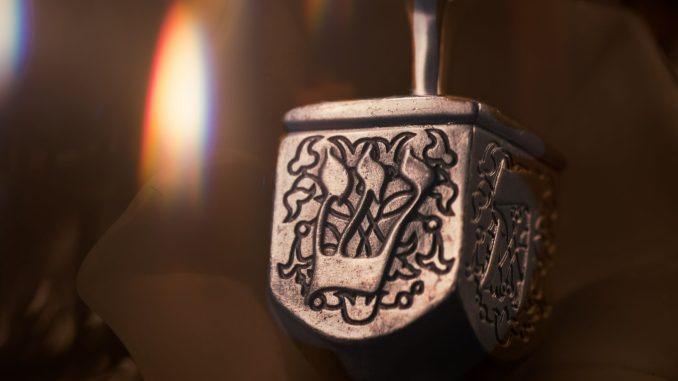
Hanukkah
Hanukkah, the Jewish festival of lights, is celebrated around the world today. But the inspiration for the holiday dates back thousands of years in what is today the country of Israel.
In 175 B.C., King Antiochus, whose ancient kingdom included Judea (located in present-day Israel), made it against the law for people who lived there to practice their religion, called Judaism. Instead, he wanted Jews to worship Greek gods. When they refused, he ordered his troops to destroy the Temple of Jerusalem, an important place of worship for Jews. He replaced the Jewish symbols with an altar dedicated to Zeus, the king of the Greek gods.
The Jews rebelled against King Antiochus. Many historians believe that they battled for about three years to become an independent region so they could practice their religion. Finally, around 164 B.C., the Maccabees, as they were called, defeated King Antiochus and his troops.
When the Maccabees returned to their ransacked temple, they found only one jar of oil—just enough to light the temple’s candles for one day. But according to the Talmud, the oil miraculously burned for eight days—enough time for the victorious Maccabees to find more oil for their sacred candles.
Hanukkah starts on the 25th day of Kislev, the ninth month of the Hebrew calendar. Because this calendar follows the lunar cycle, the holiday begins on a different date each year. Usually, Hanukkah starts in late November to mid-December.
In 2023, Hanukkah starts the evening of December 7 and ends on December 15.
Jews celebrating Hanukkah light candles in a candleholder called a menorah for eight nights. The menorah holds nine candles—one for each night plus a candle called the shamash used to light the other candles.
Diwali
Diwali is the Hindu festival of lights with its variations also celebrated in other Indian religions. It symbolises the spiritual “victory of light over darkness, good over evil, and knowledge over ignorance”. Diwali is celebrated during the Hindu lunisolar months of Ashvin (according to the amanta tradition) and Kartika—between mid-September and mid-November. The celebrations generally last five or six days.
During the festival, the celebrants illuminate their homes, temples and workspaces with diyas (oil lamps), candles and lanterns. Hindus, in particular, have a ritual oil bath at dawn on each day of the festival. Diwali is also marked with fireworks and the decoration of floors with rangoli designs made from colored powders, and other parts of the house with jhalars (banners). Food is a major focus with families partaking in feasts and sharing desserts. Many towns organize community parades and fairs with parades or music and dance performances in parks. Some Hindus, Jains and Sikhs will send Diwali greeting cards to family near and far during the festive season, occasionally with boxes of Indian confectionery. Another aspect of the festival is remembering the ancestors.
Kwanzaa
Celebrated every year from December 26 through January 1, Kwanzaa is a week of festivities honoring African American culture and heritage. Friends and family gather each day to give thanks, exchange gifts, and share feasts.
The holiday was created in 1966, during a time period when many Black people faced unfair treatment because of their skin color. The holiday honors African American people, their struggles in the United States, their heritage, and their culture.
Kwanzaa means “first fruits” in Swahili, and refers to the joy and unity many Africans have when celebrating the harvest season. The holiday encourages people to honor seven principles: unity, self-determination (helping yourself succeed), collective work and responsibility (teamwork), cooperative economics (sharing), purpose, creativity, and faith.
A big part of celebrating Kwanzaa is lighting a candle each night. First, an adult pours a little water or juice from the unity cup onto the ground to remember the family’s ancestors. Then the cup is passed to each family member, who sips while everyone chants harambee (Swahili for “let’s pull together”) seven times.
Even though Kwanzaa lasts for seven days, the big celebration is on December 31. That’s when family and friends gather in bright African-style clothing and have a large feast, called karamu. They play music, dance, and sing.
The last day of Kwanzaa is much quieter. On January 1, people focus on how they want to succeed in the coming year and what kind of person they want to be in the future.
—Compiled from the Internet by Amanda Olsen

